Boom
To be fair, I never really expected this book to come to fruition. I wrote the first draft, sent it off to people to read and ask if there was something there, and I had no intention of touching it further. Only, I kept tweaking it and kept tweaking it until it eventually was finished.
This is a book I wrote because, over the years, I’ve come to hear people rave on about how space novels are all about diversity, but they tend to exclude some of the most creative and courageous people I’ve ever encountered: people with disabilities.
I grew up with family and a lot of friends with severe physical or mental disabilities. In space books, they tend to treat disabilities like something that was and should be cured. I know, a lot of people are screaming “Geordi Laforge” right now. I love Geordi, but his disability is still treated like something the future wants to fix rather than something the future wants to embrace. He’s really not blind with his visor. If you watch the show, you’ll find he doesn’t want to get rid of his disability, except that he does because he always wears his visor and he upgrades to new ocular implants in the movies.
It’s just odd to me how much the sci-fi futures try to cure a particular group of diversity when they could be learning from them.
Likewise, it bothers me a bit how everyone who works on the bridge of a space ship seems to be some elevated form of genius, and each one acts as if they hold the equivalence of thirty-seven Ph.Ds. Not that I don’t love these stories or characters myself, but I feel they’re set up to invite race and relationship diversity, but they also overlook intellectual diversity.
So, I wrote this book to answer the question of what might happen if the cadets from the special education classes from the space academy got the chance to step up and show what they could do on a bridge to protect their home. What if they were given the chance to shine? What if they were thrust under the command of a captain whose genius wasn’t in tactical, engineering or piloting but instead in good, old-fashioned team dynamics, kicking butt and taking names.
I went from not being sure about this book to jumping right in to working on the next entry in the series. The last in the series? Who knows?
Or available in e-book on Amazon
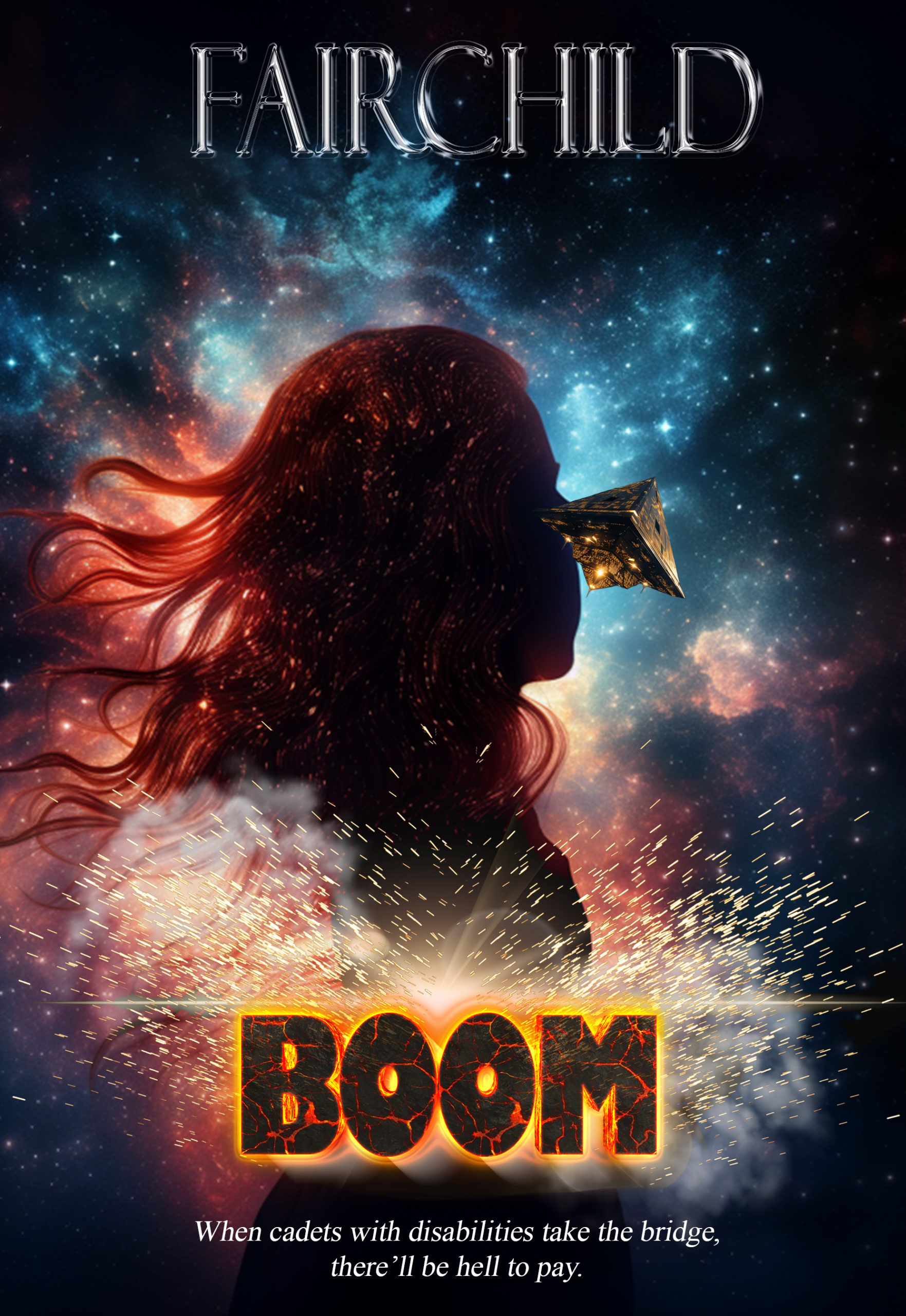
Rumor has it that Earth has a god that can destroy entire galaxies and birth new ones if she ever finds her mate.
Naturally, every species in the galaxy wants her.
Earth’s prime admiral pardons “Barbarian” Captain Vincenti Merrecci from prison to prepare a new ship and crew for imminent war.
When The Divide attacks before his ship is ready, Merrecci finds help from the only people he managed to save during the attack: The cadets from the program for students with disabilities—the very people he argues should not be allowed in the academy.
Jello Freeways: 10 ways Students Sabotage Their Efforts
cAMPuS nIGHTMARES (VOL. 1)
I didn’t write this book alone. I never could have written it without a former student of mine, Elyse Kunzler, who shares her unique, student perspective, in contrast to my own, on the issues shared in this book.
I’ve had a lot of students: students who excel; students who push themselves; students who accept responsibility for their actions and behavior. But I’ve had many more students who blame others for their lack of interest in their own success and misunderstanding what a degree is.
I’ve had many students who have used the term “I worked hard” as though that were an excuse for them to receive a higher grade they did not deserve. It prompts me to hold discussions with my class regarding, right effort and wrong effort. It’s a notion that this book is written around.
A person can have a job to do. For instance, a contractor can be hired to build a freeway. That contractor can put in the correct effort and build it with proper tools and materials (such as steel and concrete) that will allow it to stand for decades (and contribute to that contractor’s reliable reputation). Or, a contractor can build the freeway out of Jello and watch it all melt down around them. With either approach the contractor puts in effort to build the freeway. It takes a lot of effort to stand over boiling pots of Jello and pouring it into miles upon miles of molds to make it take on the shape of a freeway, but it doesn’t mean it was the right kind of effort. Crying, “But I worked hard” isn’t going to make the people who hired you say, “Oh, all right! We’ll consider the job done to satisfaction.”
This past semester I had a student leave a note in my end of the semester evaluation giving the worst marks possible. Every other mark I got was on the opposite end of the scale, praising me and fueling my ego. But one student made the statement that he, she or they learned more from reading and doing homework than from class, and I immediately knew this student did not do his part. For had this student done their part, I would have not been require to take a mind reading class to know this student, although taking up a seat in my class, wasn’t actually attending class. Had the student done this, I might have felt guilty and thought, “What could I have done better.” Because the student never spoke to me about any of this during our fifteen weeks of class together, I found myself thinking, “Why am I suppose to be more invested in your school work than you are?”
That’s precisely what one of the points this book discusses in how students sabotage their efforts. Sometimes, students are protected from truths that they need to hear to help them succeed in college. They might not understand that little tips and actions can improve not just their grades but their enjoyment while earning degrees. I wrote this book to help students hear some of those truths. If you are open to hearing these truths, this book can be an armor for better grades. If you’re not open to hearing these truths, you’re REALLY going to hate and misunderstand the purpose of getting a degree.
As a professor, I share many of these tips with my students and I see a huge difference between students who become aware of how they interfere with their own learning, and those who have never taken the time to truly learn what their learning environment is all about.
If you are a student who cares about your personal success or you are friends with a student, I invite you to read this book. It works.
Or available in e-book on Amazon
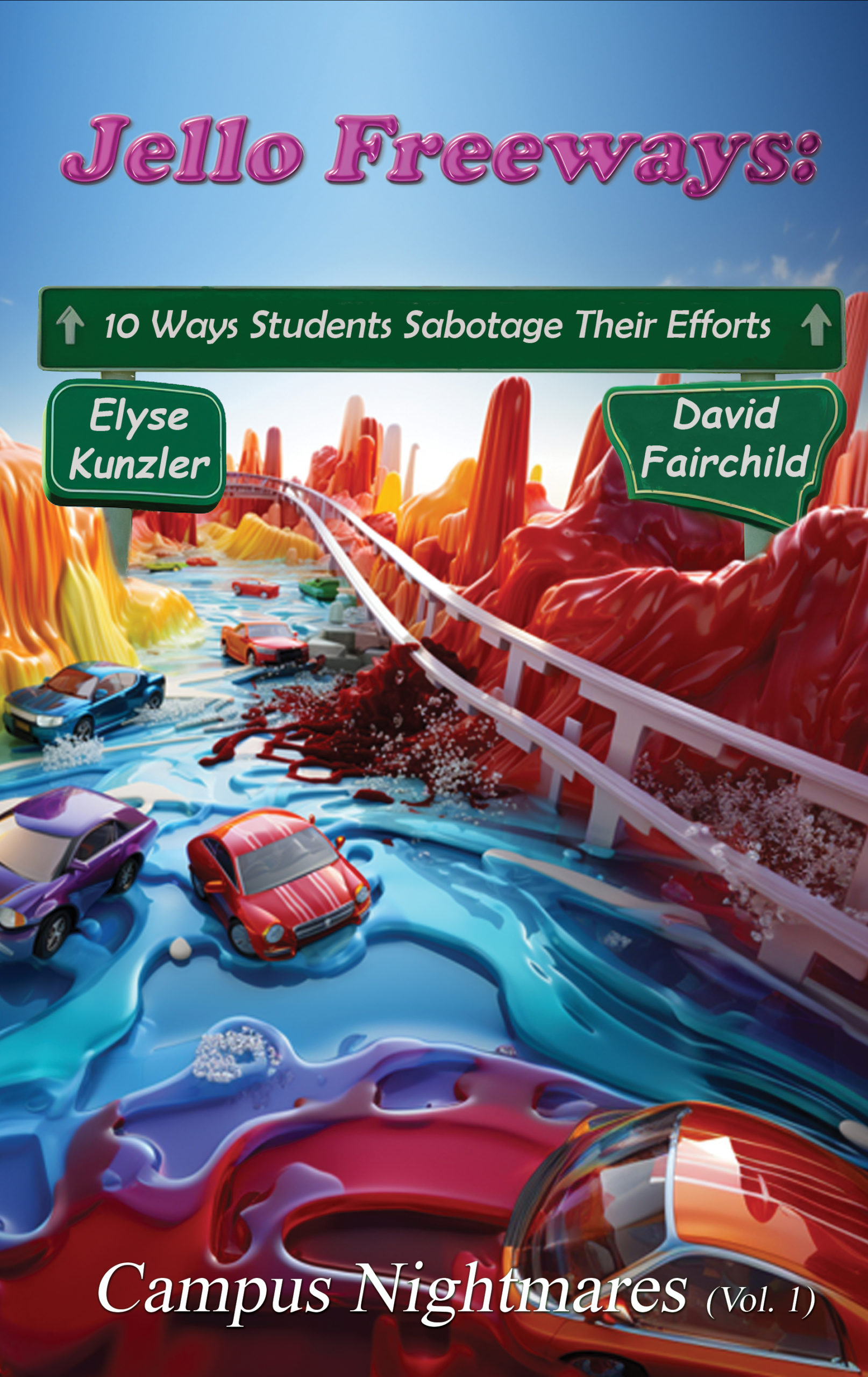
Students want the best grades and the best experiences while in college. After college, they want great careers. What they practice in college, they carry with them into their lives, but it’s easy for students to not realize that they might be sabotaging their own grades. Jello Freeways: 10 Ways that Students Sabotage their Efforts alternately shares perspectives from both university professor David Fairchild and his former university student Elyse Kunzler about how students can avoid these harmful traits.
Steering Classes off Cliffs: 10 ways Professors Sabotage Students to Crash and bURN
cAMPuS nIGHTMARES (VOL. 2)
Finalist recipient in the category of Education/Academic (Non-fiction) from NGIBA.
One detail, if not the biggest detail, that I’ve learned from teaching (and meeting teachers and learning from all kinds of teachers), is that teachers are far from perfect (despite what many far from perfect students may think). One problem I’ve learned though is that a lot of teachers forget this lesson.
I first conceived of this book when I was sitting in the faculty offices one day and I was listening to a professor discuss one of her students’ writing. As the student sat down to have a conversation with this professor, the first words out of the professor’s mouth were, “Your writing has a lot to be desired.” As a mentor and teaching of writing myself, this cheesed me. I don’t care how good of a writer you are, if you have to degrade another writer to make yourself feel like you stand a little higher, you’re a bad writing mentor. I realized that the same is true in teaching.
I started listening more to students in the halls, listening to teachers and their approaches. What I found is that there are a lot of teachers who don’t realize that they are the reason their students don’t perform better in class. I’m one of them.
This book became something that I had to write for myself as much as for other professors who, like me, forget our roles are to inspire, not squish beneath our boot.
I didn’t want this book to become something that sounded like one professor was telling other professors, “I’m smarter than you and better than you.” I wanted them to hear it from a student as well. So I invited a former student of mine in my own classes, Elyse Kunzler, to provide that perspective.
We spent hours on the phone and numerous email exchanges concerning what topics we thought teachers most often overlooked in how they harm their own students’ work. We honed in on ten, and they weren’t always easy to hear on my end. The book discusses items from ego getting in the way of their teaching, becoming an audiobook rather than a teacher, piling on too much work, etc.
If you’re a teacher, I invite you to read some of the hard truths that I had to endure while reading this. If you’re a student, and you feel a teacher could use this, I invite you to use your voice and direct a teacher to read it.
As difficult as it was to face some of the truths in this book, I wouldn’t change the experience for anything in the world. Working with Elyse has been one of the greatest opportunities that I have ever had.
Or available in e-book on Amazon
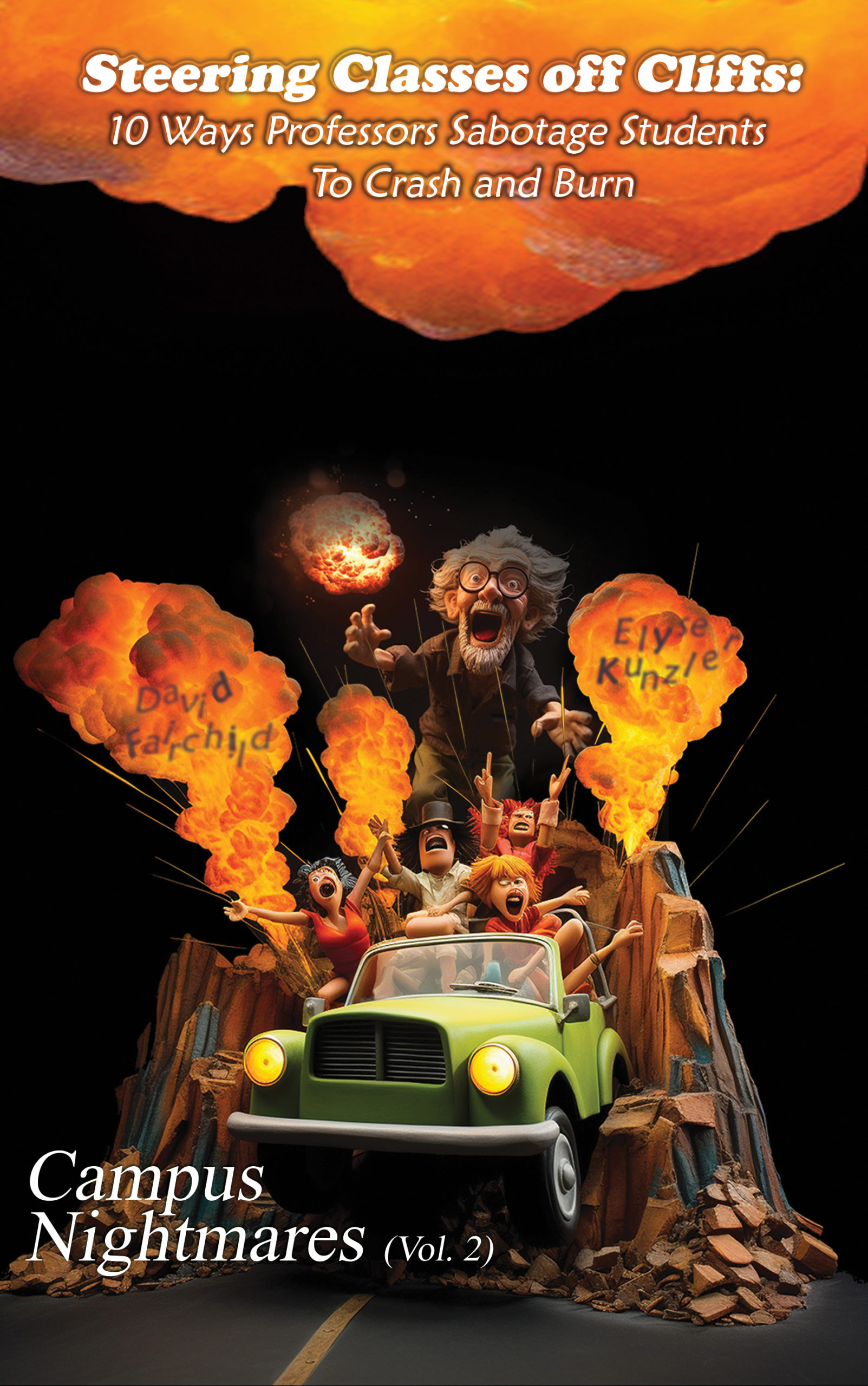
Teachers are allies to students. They mentor, support and encourage growing minds. What the teacher imparts can carry on with students for years to come. Attitudes that students observe in college can carry with the student into their careers and lives. Sometimes, professors may not be aware that the attitudes they pass on in their classes may actually be sabotaging their own pupils in ways that affect their other classes, even their lives and future careers. Steering Students off Cliffs: 10 Ways Professors Sabotage Students to Crash and Burn speaks to professors through the comparative perspectives of both university professor David Fairchild and his former university student Elyse Kunzler to help identify ways that they have experienced how professor attitudes and approaches may be harming students more than sustaining.
Campus Nightmares (Vol. 2) aims to help improve relationships between teachers and their pupils so that the pedagogical relationship may be more enjoyable for both.
The Exodus
There is so much I could say about where this book comes from, but there are too many people in this world who are too eager to call for another human being’s destruction simply because of something they say, so I’ll keep these details to myself.
This book was inspired by the way that human nature needs to have a villain’s face to put on a problem in society, and how far we’re often willing to go to protect ourselves from that villain simply because they’re easy to point to. This book is about the consequences of the insanity that so often floods our society because we have confused allowances from Terms of Service with freedoms granted by the Constitution, God or simply inherent to being human.
If you’ve ever found yourself troubled by the direction a society can go because of a people’s willingness to take offense and seek the destruction of others simply because its people disagree with each other, then you’ll understand where this story came from for me.
This story started, for me, driven by these notions and our need to vilify others so that we can feel like we’re solving a problem and making society a better place.
I thought about many ugly people in society as I crafted this book, and I thought of people who are considered ugly for no reason other than other people want them to be a villain. Every day, it seems it gets more impossible to escape being tagged as someone the masses deem as ugly. Every day, it seems to get easier to attack our fellow beings. Every day, we become more comfortable with this act of destruction.
So how do you escape? Where do you go? Who do you trust.
From the beginning it was my full intention to create a story about an underground railroad for people with mental disabilities or illnesses because they are so often vilified for so many of today’s problems in society, but then the tunnels grew to help others who had been vilified.
This is one of the most difficult pieces I’ve ever worked on. I met so many people in the creation of this book, people who were not like me and didn’t have the same values. It was difficult for me to let so many of them hold the values, behaviors and opinions that so many had, and I had to let them be their human selves. It felt wrong in writing a book about offense and various angles of diversity to restrain the characters to subscribe to how I would have them speak so as not to offend my audience or people who know me. Any time I tried to infringe on their behaviors or values in any way, they stopped being who they were, and they stopped telling their story.
I say it in my book, and I’ll say it here. I don’t agree with my characters, but this isn’t my story and I wasn’t there. I’ve written about werewolves. I’ve had a career in scaring people in other forms of media, and many of these people are the most frightening characters I’ve met, and they made sure I didn’t forget it as this story unfolded before me.
I love the characters. I love the story, and I just cannot bring myself to force their humanity into hiding simply because some audiences and friends have certain predispositions on how a book should behave or what it doesn’t need. I know many people used to my previous works won’t like this because of its characters and how they may conduct themselves, but that’s how humanity works. We don’t always like what other people say or do.
I would also be remiss if I did not gush over my audio narrator on this book, Jacqueline Rendell. She is one of the most gracious human beings I have ever had the opportunity to work with, and what she did vocally and soulfully to bring this book into audibook was nothing short of brilliant and masterful. As always, Jacqueline, THANK YOU!
Also available in amazing audiobook, narrated by the amazing Jacqueline Rendell on Amazon
Or available in e-book on Amazon
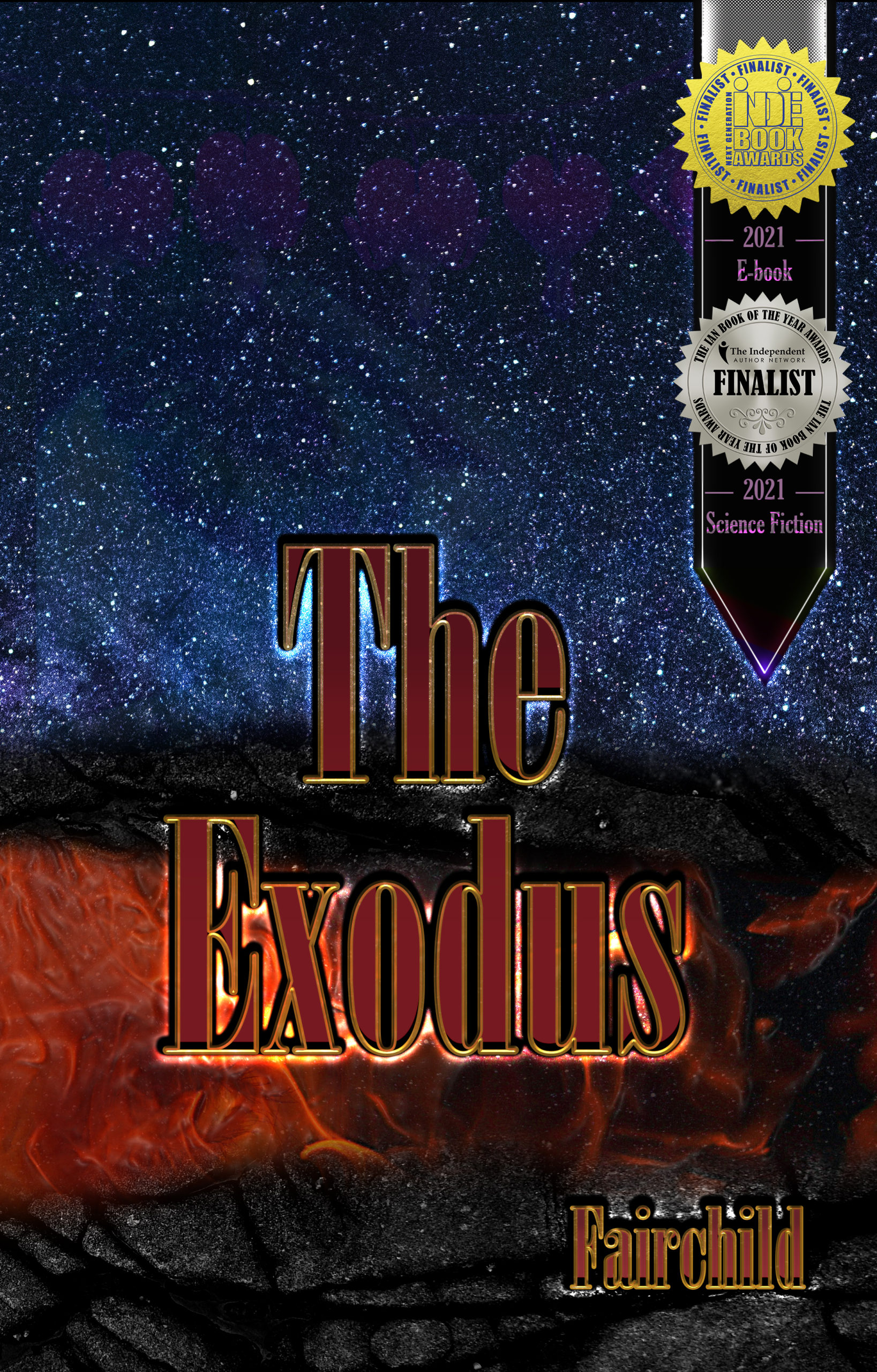
A girl who feels nothing; a boy who sees shadows and hears what others cannot; a baby without license to be born; a deaf teenager and scientific savant; offensive people; a general who passed law to hunt, imprison and kill them all.
Where do they hide when the sub-nations of the United States draw their own lines in the ground that dictate which people get to be oppressed and who gets to be offended?
The Salvo Cartel built the tunnels to help them escape, to aid those with mental ailments, those who question, those who refuse to conform, gays, Christians, artists, people with scruples, and other deviants.
Do they flee to Salvo’s underground cities, with eyes set on a grander safeplace?
Where do they go when Lady Liberty douses her light?
Perhaps the same place she’s been pointing her torch towards ever since she stepped atop her pedestal and realized at once that one day she too would be told to shut up.
Circle of Dogs (Book One: The New Paladin
This was my first published work, and it was a complete nightmare to get done. It took me about a year to write and it was intended to only be one book. I’d started it in the late 90s and didn’t own a computer so I had to type it out. I put it in an envelope and tucked it into my briefcase so I could take into someone who could make some copies for me so I could submit it for publication.
On the way, I had an appointment to meet up with some family. I left the briefcase in the car, and when I came back someone had broken into my car and stolen the briefcase with the manuscript. I’ve never seen anyone try to publish the story, so I can’t say that I know who it was.
So, I started writing it from scratch and invented a new way to kill off werewolves, and then I made the mistake of going to a new werewolf movie where they killed the werewolves in the exact manner I had invented, and I had to rewrite the entire book.
What was originally meant to be one book, I could see was going to suddenly be three.
So I rewrote the book and began submitting and I played the waiting game. Meanwhile, I went on to graduate school and earned my MFA. Finally, the day came that I received an email from a publisher with a name that made me happy, the email was from an editor who wanted to inform me that this book had been accepted for publication, and they thought I should know that, but then proceeded to inform me that the owner of the company had come in that morning and announced that they were going out of business.
At the same time, I had just graduated right when the job market went south, and overnight job postings just disappeared. I needed money and I had the book. So I conducted an experiment to see if I could make money off of it on my own, and I published it myself, and I did make money. So I continued to publish it myself.
Immediately people started mocking me, and I really didn’t care because I knew where the book was going; I knew it wasn’t the perfect book, and I didn’t try to pretend that it was. I did, however, know that I had a new approach on werewolf lore and I saw the potential for where it could go. I knew that I had taken the typical werewolf lore and turned the monsters into some much more fearsome and showed the person turning into a werewolf at the full moon was just the tip of the iceberg of their true enslaving powers. The book expanded the entire lore.
So I started on the second book.
I have to give high kudos to my artist Brittany McConnel. I gave her an idea for an elaborate book cover and she set me straight on keeping it simple. She read a description of the wolf and drew this face that disappeared into black, and I immediately fell in love with and knew I wanted her to do all my werewolf book covers. She’s an amazing artist and one of my favorite people and I think she’s been every bit as a contributor to the success of this series as the story itself.
Her work can be viewed at https://www.deviantart.com/anilede
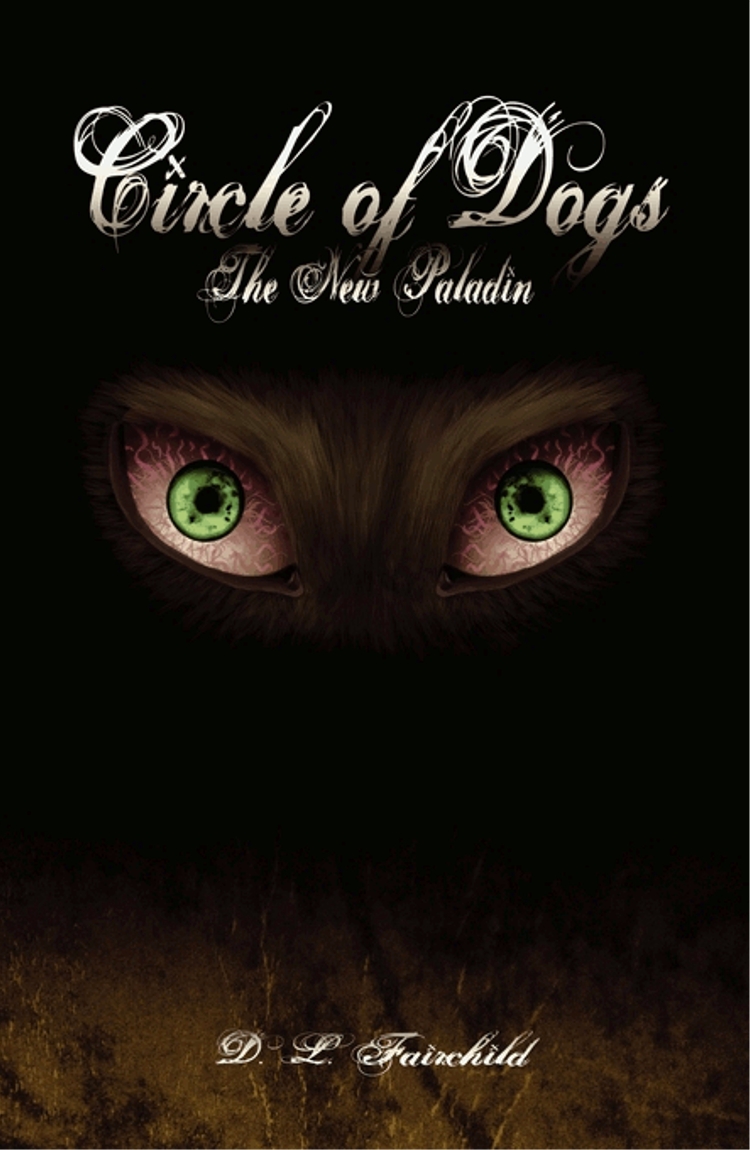
You Know the myth. It’s simple. A man bitten turns into a werewolf on a full moon and silver can kill him. Don’t be stupid.
Few people live who know the realities about werewolf mythology. Those who believe in the killing power of silver, die. Those who know better, know that the full moon is the werewolf’s weakness, not its power, and that the full-moon myth merely lines the surface of a greater and more dangerous world.
After a stray cocker spaniel kidnaps his sister, Josh Revlon naively sets out to rescue her, but finds himself thrust into a harsh, new world filled with wolves, monsters and deadly secrets.
Today, Josh believes in myth. Tomorrow, alongside allies who only exist in fairy tales… he hunts.
Circle of Dogs (Book Two): Wolf
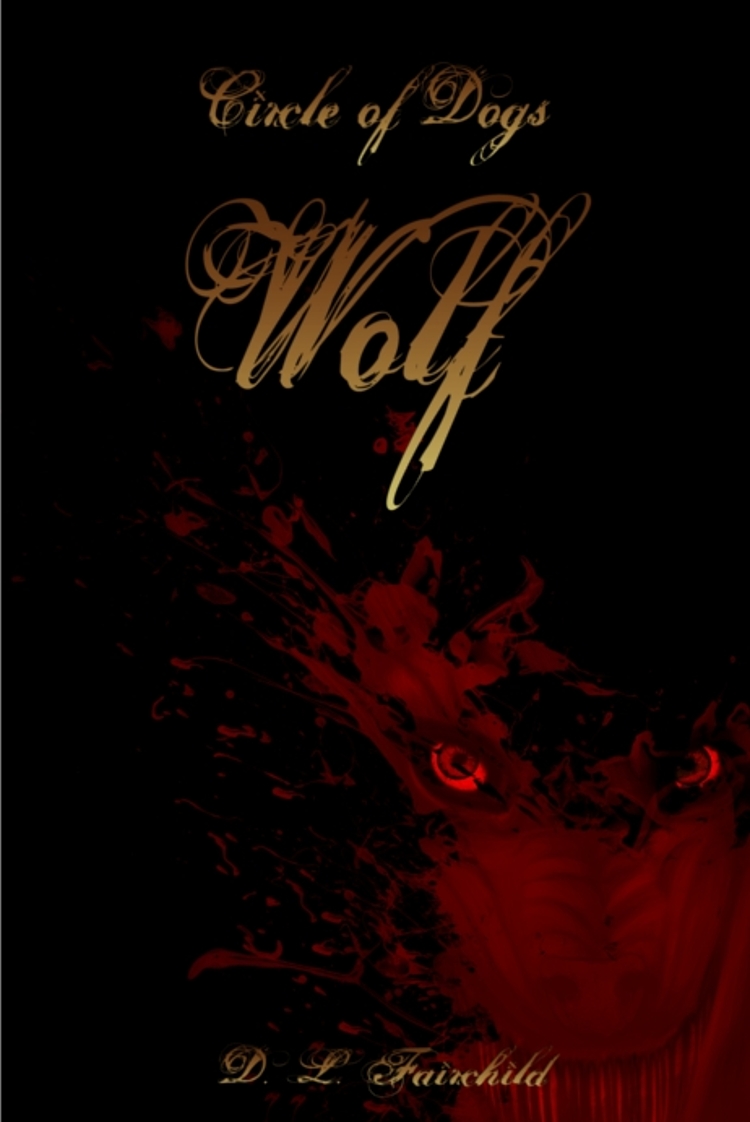
He comes. The rogue knows who she is and he comes. . . for her.
His army of monsters invades Plattsville. With an eye still set upon finding his sister and destroying Jasper, Josh Revlon and his allies, under the counsel of Speatsh Cheatham, search for the means to weaken the rogue’s gathering army.
As Jasper prepares Plattsville for more of his kind and their forces, Josh confronts new enemies, reacquaints himself with old friends and welcomes deadly new. . . allies?
Today, Josh Hunts Tomorrow, he faces extermination.
For the second book in this series, I wanted to give a hint to the true and dark world of the werewolf. I wanted to give readers a peek to their organization and their farms of humans.
After writing it, my initial reaction was that it wasn’t as interesting as the first. I thought the story was weaker, but my editorial staff and readers were telling me otherwise. So I stayed with it and continued to edit and revise it for publication. I call it my unpredictable book because I actually mixed experiment with my overall plan. The experiment was that I decided not to plan the book. I knew the type of outcome I wanted, but I didn’t know who I wanted to accomplish tasks, and I sat with a coin at my desk and flipped it to decide who would take an action or who would be a character of circumstance. I wrote as ambiguously as possible so I could leave the story open to accept whatever happened. The reality was, I didn’t know who was going to live or die, or who was going to end up making decisions or facing consequences. I lied. I knew one character that something was going to happen. A) because he was difficult to put up with, and B) for what I anticipated might happen in book three.
After releasing the book, I immediately began to get the feedback that my readers knew which characters were going to do what and knew how the book was going to end, and every time they said it I had to contain myself from saying “Bull! I didn’t even know. The coin decided.”
And so I started book three, and would prove to be a bigger nightmare than my first book to produce.
Again, Brittany’s work was brilliant. I had given her only two pieces of direction: 1) I want blood splatter with one of my wolve’s faces in it, and I didn’t want it to be too much gore. I think she spent about a week on it. I fell in love with it the moment I saw it because it was even more than I had expected and it was brilliantly executed.
Circle of Dogs (Book three): Eulogies
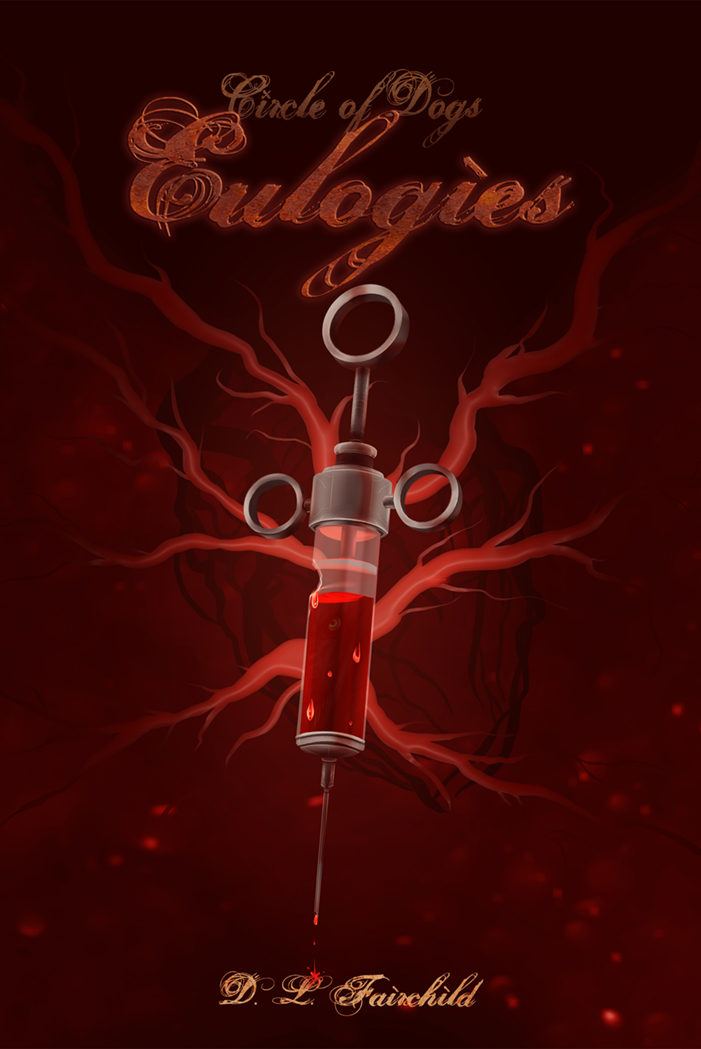
The rogue has arrived. His army has taken Plattsville, and he knows where the ancients hide. He has come for them. He has come for the heir, and he has come for the ancient carriage that can redeem power.
Yet, first, he has plans for Josh and his growing band of hunters and the refugees that they stole from his farm. They are cornered now, there in that deathtrap of a junkyard.
Here, Josh will die.
But the rogue does not know all. For instance, he does not know about the woman that Jasper keeps in his pocket nor her secrets in the shadows that you have seen, but he has not.
Today, vengeance fights vengeance, and the piper must be paid.
Tomorrow, there will be many graves.
The final chapter in my werewolf series (maybe).
I rewrote it THREE TIMES and hated the way every version ended up. I had an idea of how I wanted it to end. I knew it would be a confrontation between humans and werewolves, but there was always something that didn’t settle with me. So I started over and from scratch three times. During the process, I met several characters that I had wished would have shown themselves more in the previous books. They were so impressive to me that I can’t bring myself to say I am done with this story.
Where the first book had a nightmare history prior to printing, this third book will forever haunt me as one of the most difficult and disheartening journeys ever. I had planned to release this book several years ago. I had developed an ending that I was so happy with. I won’t say I hadn’t seen the like of it before, but nothing like this. And then a very popular movie was released that did EXACTLY the approach of an ending that I had toiled with for nearly ten years. I still love the book. I’ve written it three times. I am not writing it a fourth because there’s no way a fourth version of it could outdo what this one does.
Where’s the blood?
25 Creative Writing Exercises with
Motivational Anthology
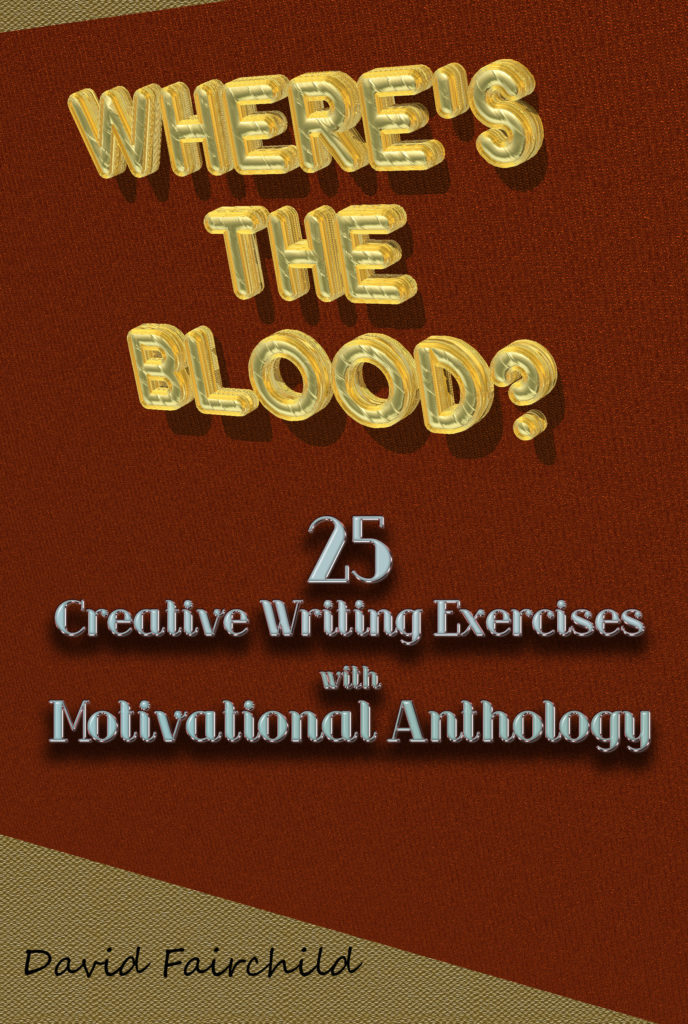
No, it’s not about writing gore, and it’s not about how or what others tell you to write.
Inside this book, you will find 25 creative writing exercises that are about discovering your own voice, talent and style. 25 exercises to help you grow. . . 25 exercises for fun. . . Whether you’re a beginner or a pro. . . With a little inspiration from some of the greatest authors of all time. . . This book is all about discovering the stories behind the details. It’s about taking pride in what you write. It’s about practicing the right way as a writer. It’s about you.
While I was taking part in a convention some time ago, a young woman approached me and asked about ways to improve her writing. While we were talking, another woman approached who knew that she was the smartest writer on the face of the this earth and decided she needed to interject. She suggested at once that since I had taken university writing classes, that I had a lot to unlearn.
Ever since this day, I have rebuked this absolutely horrific counsel. Writers surround themselves with practice. Sometimes they will encounter practice that they don’t like. Sometimes they will feel berated by others or that they don’t agree with. Sometimes they will have to write for people that are difficult to connect with. When you practice, you’re not saying that you’re going to adopt everything that other people tell you to do. You’re going to develop a voice, and in that development, you’re going to discover what your strengths are, what your weaknesses are and develop an ability to reject what you don’t like that other writers do while learning to adopt other skills similar to what different writers may do.
You may have a teacher that you have to write for that hates everything you write, but that is practice in not only rejection (which is central to being a writer) but also pushes you to learn how to connect and write for an audience that might not be your favorite. A teacher in a classroom, is one person, one audience member. If you can’t learn to write for an audience of one person, what makes you think you can learn to write for an audience of 100 people or millions of people?
I told the aspiring author seeking advice to first and foremost ignore what the intruding woman had said about taking classes, and simply asked if she thought she could think of a better place to get practice writing than in an environment with many people seeking similar goals of learning the publishing and writing industry, while at the same time having access to many teachers who had proven themselves in the publishing arena.
I wrote this book, not to tell people how to write, but to offer a variety of practice while showing short stories and passages from literature that came from prominent authors that demonstrated how the exercises have played roles in these writer’s works as well.
This book merely offers another outlet of practice, and every writer should immerse in practice regardless of whether it’s in a classroom, a writing group, a reading group, reading a book, etc. ANYONE who suggests otherwise, is not a writer. That person is a phony in sheep’s clothing.